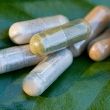Anxiety
Dietary Supplement Interactions
Even all-natural herbs and supplements can interact.
Posted August 1, 2013

Anxiety and mood disorders are a daily struggle for millions of people in the United States. Whether it’s long-term stress accompanied by heart palpitations and nausea, or persistent sadness and loss of interest in activities that were once enjoyed, these conditions can be frustrating and debilitating.
The National Institute of Mental Health (NIMH) estimates that in a given year, anxiety disorders affect about 40 million Americans over age 18, while depressive disorders affect approximately 18.8 million in the same population.
The good news is that there are many complementary and alternative treatments available to help reduce symptoms of depression and anxiety. Many of these integrative therapies are backed by strong or good scientific evidence, according to Natural Standard research.
But don’t rush out to the store just yet – there’s a catch. Just because a product is all natural and backed by science to be effective in some people does not mean that it cannot interact with other drugs, herbs, and supplements.
Let’s take a look at some herbs and supplements with anti-anxiety and antidepressant effects and their potential interactions to be sure that proper monitoring parameters are in place with your healthcare providers. In general natural therapies should not replace using more proven therapies for well studied medical conditions.
Kava
Kava (Piper methysticum) is a shrub that has been used to make beverages for centuries, most often for ceremonial and social purposes in the South Pacific and in Europe. Many human studies have demonstrated kava’s effectiveness in treating anxiety, with results seen after as few as one to two doses and progressive improvements over one to four weeks. Early results suggest that kava may be as effective as benzodiazepines, the conventional drug treatment for anxiety.
Although there is strong scientific evidence to support the use of kava for anxiety, there has been some growing concern over its potential health risks. Multiple cases of liver damage have been reported in Europe, and the U.S. Food and Drug Administration (FDA) has issued warnings to both consumers and doctors. It is still unclear what dose or duration of use is linked to the risk of liver problems. Chronic or heavy kava use has also been linked to changes in the nervous system and high blood pressure in the lung arteries.
In addition to possible interactions with anxiety medications, antidepressants, blood thinners, and birth control, kava may interact with bee pollen, black cohosh, foxglove, guarana, melatonin, nettle, St. John’s wort, valerian, and other herbs or supplements with similar effects.
St. John’s wort
St. John’s wort is the plant species Hypericum perforatum and is a popular supplement that is commonly used to treat depression. Numerous studies report that St. John’s wort is more effective than placebo and equally as effective as tricyclic antidepressants for the short-term treatment of mild-to-moderate depression. Overall, research supports the use of St. John’s wort for this purpose and it is backed by strong scientific evidence.
However, St. John’s wort may cause many serious interactions with a wide range of prescription drugs, herbs, or supplements. Possible interactions include pain relievers, blood thinners, antibacterials, antidepressants, anti-inflammatories, antioxidants, birth control, mood stabilizers, iron, thyroid agents, and valerian, among many more agents, herbs, or supplements with similar effects.
DHEA (dehydroepiandrosterone)
DHEA is a hormone that is made in the human body and is secreted by the adrenal gland. DHEA is part of the process of male and female sex hormone production. After the age of 30, DHEA levels in the body begin to decrease. Levels are also reported to be low in some people with anorexia, end-stage kidney disease, type 2 diabetes, AIDS, adrenal gland disorders, and critical illness. DHEA levels may also be reduced by a number of drugs, including insulin, corticosteroids, opiates, and danazol.
DHEA has been studied for problems with adrenal gland function, weight loss, and lupus, in addition to many other medical conditions. There is good scientific evidence in support of the effectiveness of DHEA for use in treating depression.
As with the first two therapies, there are potential interactions associated with DHEA. Anti-anxiety and antipsychotic medications, calcium channel blockers, agents processed by the liver, alcohol, insulin, vaccines, and blood pressure-lowering agents are a few drugs that may potentially interact with DHEA, while herb and supplement interactions include fiber, flavonoids, probiotics, soy protein, vitamin E, and yam, among others.
Phenylalanine
Phenylalanine is sold as a dietary supplement in the form of L-phenylalanine, D-phenylalanine, and DL-phenylalanine. L-phenylalanine is an essential amino acid in humans, and proteins contain only this form. According to experts, L-phenylalanine likely is likely safe when consumed in amounts that typically occur in food. The role of D-phenylalanine in humans is unclear. DL-phenylalanine is a synthetic product made of 50% D-phenylalanine and 50% L-phenylalanine.
There is good scientific evidence to support the use of L-phenylalanine or DL-phenylalanine to treat depression.
Potential drug interactions of phenylalanine include antidepressants, antipsychotic agents, heart health agents, agents that affect the immune system, and sedatives, among others. Potential herb and supplement interactions include acupuncture, amino acids, and vitamin B12, among others.
Saffron
Saffron comes from the crocus (Crocus sativus) flower and is a very expensive spice. Around 75,000 blossoms are needed to make a single pound of saffron, and for this reason, the price of saffron can range from $50 to $300 per ounce. Saffron has a long history of use as a spice, medicine, and yellow dye. The crocus was reportedly used by ancient Greek and Roman civilizations and in medieval Egypt.
Saffron may have anticancer, nerve protective, and antioxidant properties and may have effects on the immune system. Saffron has also been studied for its ability to improve symptoms of Alzheimer's disease, asthma, infertility, menstrual problems, and psoriasis. There is good scientific evidence in support of its use for treating symptoms of depression.
Saffron may interact with a wide range of drugs, herbs, and supplements, including anti-diabetic agents, anti-inflammatories, cholesterol-lowering agents, fertility agents, sedatives, antioxidants, and pain relievers, among others.
So what’s the take-home message? Although some complementary and alternative therapies might be backed by solid evidence for anxiety and depression, it is crucial that you speak to your doctor or pharmacist before taking any new herbs or supplements.
Not only can a qualified medical professional help you choose the product that may work best for you, but may also help you avoid severe interactions with other medications or integrative therapies you may be taking.
And that makes one less thing to worry about on your way to becoming happier and healthier!




